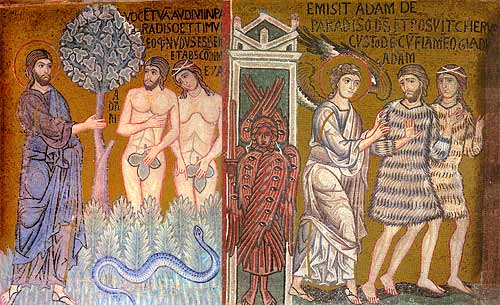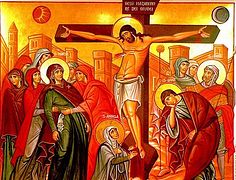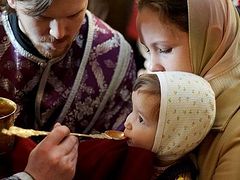What does the Church teach about having non-believers in our homes and parish Temples? 2 John 1:10, seems to suggest that we should not have anyone who professes a teaching contrary to the Trinitarian faith into our homes, or to even greet such a person. Was this message specifically for one person or one type of person? Does this chapter have anything to do with the historical practice of keeping the Creed a secret or in asking Catechumens to leave before the Creed is recited in the Liturgy? How should Orthodox believers apply this teaching to our own lives?

In addition to the passage you referenced, there are many similar passages that could be cited. For example, St. Paul wrote:
Now we command you, brethren, in the name of our Lord Jesus Christ, that ye withdraw yourselves from every brother that walketh disorderly, and not after the tradition which he received of us (2 Thessalonians 3:6).
And Christ Himself said, when speaking of an erring brother, who refused to be corrected after many attempts:
...but if he neglect to hear the church, let him be unto thee as an heathen man and a publican (Matthew 18:17).
But the passage that most directly addresses the question of fellowship with someone who erring is 1 Corinthians 5:11:
But now I have written to you not to keep company with anyone named a brother, who is sexually immoral, or covetous, or an idolater, or a reviler, or a drunkard, or an extortioner—not even to eat with such a person.
All of these passages speak of people who are in serious error, either doctrinally, or morally, and clearly, these passages teach that there are some circumstances in which we should have no fellowship with such people ... but the question is, what kind of people are were talking about, and under what circumstances would this apply?
First, let's consider who it does not apply to:
1) It definitely does not apply to unbelievers, which is clear simply from looking at the two verses which precede the passage in 1 Corinthians 5:
I wrote to you in my epistle not to keep company with sexually immoral people.Yet I certainly did not mean with the sexually immoral people of this world, or with the covetous, or extortioners, or idolaters, since then you would need to go out of the world (1 Corinthians 5:1-10).
The point being that one could not possibly refrain from some degree of fellowship with the vast majority of the people in St. Paul's time who were unbelievers. Also, Ambrosiaster* notes:
Paul does not forbid the Corinthians from eating with unbelievers, since he says: If an unbeliever invites you to dinner and you want to go, eat whatever is put before you [1 Corinthians 10:27] (Ancient Christian Texts: Commentaries on Romans and 1-2 Corinthians, Ambrosiaster, translated and edited by Gerald L. Bray (Downers Grove, IL: Intervasity Press, 2009) p. 143).
2) It arguably does not apply to those who, though once part of the Church, have fallen into sin, and who no longer make a pretense of being among the faithful. I say this based on the example of the Lord, who regularly ate with known sinners. In such cases, he was not pretending that these people were not guilty of any sin, and were already in a right relationship with God, but was reaching out to those long estranged from the faithful of Israel.
But beyond this, we have to ask how these passages might apply to heterodox Christians. On the one hand, if we treated them as if they had been Orthodox, and then departed into heresy, schism, or gross immorality, then these passages would also apply directly to them. On the other hand, some might argue that they would fall under the class of unbelievers. But there are problems with both positions. Obviously, it is not the case that they were ever Orthodox, and so they would not have the same level of responsibility as would an Orthodox Christian who departed into heresy. But we also cannot say that there is no difference between such people and pagans.
Fr. Seraphim (Rose) puts it best, in my opinion, in a letter he wrote to someone on the subject:
In the end, I think, Father Dimitry Dudko’s attitude is the correct one: We should view the non-Orthodox as people to whom Orthodoxy has not yet been revealed, as people who are potentially Orthodox (if only we ourselves would give them a better example!). There is no reason why we cannot call them Christians and be on good terms with them, recognize that we have at least our faith in Christ in common, and live in peace especially with our own families. St. Innocent’s attitude to the Roman Catholics in California is a good example for us. A harsh, polemical attitude is called for only when the non-Orthodox are trying to take away our flocks or change our teachings (Quoted in Not of This World: The Life and Teaching of Fr. Seraphim Rose, pp. 757-758).
I would say much the same with regard to those who were baptized Orthodox as infants, but who have never really been Churched. Such people, unfortunately, are no more knowledgeable about the faith than any other unbeliever, and so we should want to open doors for such people, rather than close them.
So who would we applies these verses to?
These verses would certainly apply to heretics and schismatics who were Orthodox, but who have been formally cut off from the Church. They could also apply to those who are under excommunication for a serious sin ... but that depends.
There are many people who fall into a serious sin, and for some period of time their parish priest places them under a penance that includes being prohibited from receiving communion, but in those cases in which the person recognizes their sin, and is submitting to the penance, there would be no need to bar them from other forms of fellowship.
It would apply to those who are prohibited from communion because of a serious sin that they refuse to repent of, and who, by their open defiance of the standards of the Church, cause scandal and disruption in the Church. This, however, is a situation that I think is fairly rare. I certainly have never had to deal with such a situation.
It is a little less clear how to handle those who are prohibited from communion because of a serious sin that they are not yet prepared to repent of, but who continue to attend the services, and do so in a way that is not disruptive. In the first several centuries of Church history, when there was very strict discipline maintained with regard to who could be in Church, such people would be excluded from attending the services, and quite possibly from fellowship in the homes of believers. However, that kind of discipline ceased to be the common practice of the Church for well over a thousand years. Under today's circumstances, I do not believe that level of strictness would be in order, for such a person. It is better for them to keep coming to Church, and we would hope that they come to repentance at some point, so they could be readmitted to communion. And it would be better for them to maintain relationships with people in the Church, so long as there was no winking at their sin, or danger of others falling into their sin with them. Of course, if one had any questions about what to do, they would need to seek the guidance of their parish priest or local bishop, who are the ones ultimately responsible for imposing discipline in the Church.
The purpose of all of these verses is the salvation of the sinner or the heretic, and the edification of the Church. It is not to adhere to the letter of the law, or to punish for punishments sake.
It is said of the Old Testament Prophets that they afflicted the comfortable, and comforted the afflicted—and that saying, while pithy, actually has a great deal of merit to it. If you have someone who is a heretic or schismatic, seeking to divide the Church, or a careless sinner whose behavior is causing scandal to the Church, such a person would be in need of some measure of affliction, to wake them up. There would also be need for the shepherds of the Church to protect the rest of the flock. On the other hand, when you have sinners who are struggling with their sins, we should follow the example of Christ, and reach out to them with love. And when dealing with the heterodox, we have to keep in mind that with knowledge comes responsibility, and we cannot hold them to the same standards as someone who was raised in the Church and should know better. If they are not actively seeking to proselytize or divide the Church, we should nurture such relationships, because that is how many are ultimately converted.
*"Ambrosiaster" is the name given to the author of commentaries long attributed to St. Ambrose of Milan, but which most scholars believe to have been written by a later author.




My question is about the paragraph that starts with "Who would we apply these verses to?"
Could we also ask "How would we apply?" We all pretty much know who, unless you are gathering statistics but it still would boil down to individuals making a judgement call on the fly or pre-meditated. What about the inner judge? Shouldn't we examine if there be any heretical or grossly immoral elements within us? Would anyone make that same judgement about us? Do you entertain that we inherently possess both light and dark and that mastery, not avoidance of all elements is the key?
Thank you for considering this respectfully submitted question.
All the best. Mardi